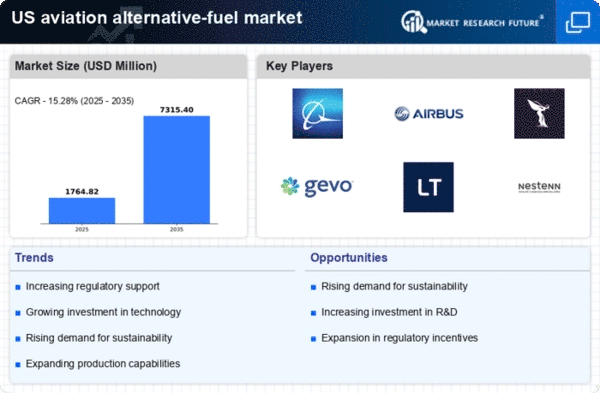Rising Fuel Prices
The aviation alternative-fuel market is experiencing a notable shift due to the rising prices of conventional jet fuels. As traditional fuel costs escalate, airlines are increasingly seeking cost-effective alternatives to mitigate operational expenses. In 2025, the average price of jet fuel in the US has surged to approximately $3.50 per gallon, prompting airlines to explore sustainable aviation fuels (SAFs) as a viable option. This trend is likely to drive investment in the aviation alternative-fuel market, as airlines aim to stabilize their fuel costs while adhering to environmental regulations. The potential for SAFs to reduce greenhouse gas emissions by up to 80% compared to conventional fuels further enhances their appeal, making them a strategic choice for airlines looking to balance economic and environmental considerations.
Public Awareness and Advocacy
The aviation alternative-fuel market is increasingly influenced by rising public awareness and advocacy for environmental sustainability. In 2025, consumers are more informed about the environmental impacts of air travel, leading to heightened demand for greener alternatives. Advocacy groups are actively promoting the use of SAFs, urging airlines to adopt more sustainable practices. This shift in consumer sentiment is compelling airlines to prioritize the integration of alternative fuels into their operations. As public pressure mounts, the aviation alternative-fuel market is expected to grow, driven by the need for airlines to respond to consumer expectations and enhance their corporate social responsibility initiatives.
Corporate Sustainability Goals
The aviation alternative-fuel market is increasingly shaped by the corporate sustainability goals of major airlines. In 2025, a growing number of airlines have committed to achieving net-zero emissions by 2050, which necessitates a substantial shift towards alternative fuels. This commitment is driving demand for SAFs, as airlines recognize the need to align their operations with environmental expectations from consumers and investors. Reports indicate that over 70% of major US airlines have set specific targets for reducing their carbon footprints, further propelling the aviation alternative-fuel market. The integration of SAFs into their fuel supply chains is seen as a critical step in meeting these ambitious sustainability objectives.
Government Incentives and Subsidies
The aviation alternative-fuel market is significantly influenced by government incentives and subsidies aimed at promoting the adoption of sustainable fuels. In 2025, various federal and state programs are providing financial support to airlines and fuel producers, encouraging the development and use of SAFs. For instance, the US government has allocated over $1 billion in grants and tax credits to stimulate research and production of alternative fuels. These incentives not only lower the financial barriers for airlines but also foster innovation within the industry. As a result, the aviation alternative-fuel market is likely to witness accelerated growth, as stakeholders capitalize on these financial benefits to transition towards more sustainable fuel options.
Technological Advancements in Fuel Production
The aviation alternative-fuel market is benefiting from technological advancements in fuel production processes. Innovations such as improved feedstock conversion technologies and enhanced refining methods are making the production of SAFs more efficient and cost-effective. In 2025, several US companies are pioneering new techniques that could potentially reduce production costs by up to 30%, making alternative fuels more competitive with traditional jet fuels. These advancements not only enhance the viability of SAFs but also attract investment into the aviation alternative-fuel market. As production technologies continue to evolve, the market is likely to expand, providing airlines with a broader range of sustainable fuel options.
















